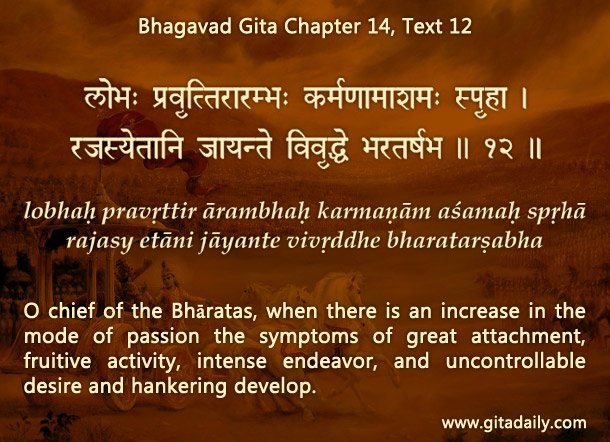Seeking satisfaction through accumulation increases accumulation not satisfaction
We all want to be happy. However, where we seek happiness determines whether we will become happy or not.
Frequently, we look for happiness through possessions, through getting more and more things, delighting in being their owners and especially in parading them before others.
However, when we get something that we have craved for, it gives only temporary pleasure. Soon, its attractiveness fades, and something else that seems more attractive pops up, frequently as the possession of others, and we start craving for it. Eventually, the more we get, the more we crave to get more things. Such greed and insatiable desire are characteristic of the mode of passion, as described in the Bhagavad-gita (14.12) The mode of passion drags our attention and our desire from the things we have to the things we don’t have. Even if we work hard enough and earn big enough to increase our possessions hugely, still there will always be things that we don’t have. And the fixation of our consciousness on those things will keep us dissatisfied. Thus, we will end up with increased accumulation, but not increased satisfaction.
Gita wisdom explains that we can find lasting satisfaction not through accumulation, but through realization – through realizing our own spirituality, wherein we understand that we are eternal blissful souls, parts of the eternal blissful Supreme, Krishna. We can realize our innate joyfulness most efficaciously by practicing bhakti-yoga, which is the path of joy eternal (09.02). It connects our head, heart and indeed our whole being with our Lord who is the reservoir of unlimited joy.
Therefore, rather than letting our power to desire get futilely dissipated in craving and slaving for accumulation, we can direct that power towards Krishna by practicing bhakti-yoga. Through the resulting spiritual realization and devotional redirection, we can relish lasting satisfaction.
Think it over:
- Can you think of some recent possession that didn’t live up to the hype?
- Why does accumulation not lead to satisfaction?
- How is bhakti-yoga the path of joy eternal?
To know more about this verse, please click on the image
Explanation of article:
https://www.youtube.com/watch?v=BbQb9Zv6eCc


Super .. Love you Prji. Its really amazing